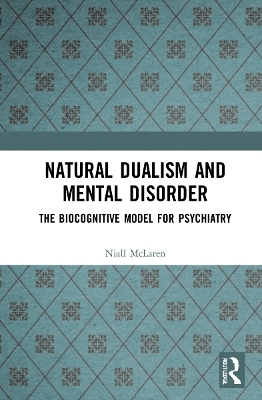
Natural Dualism and Mental Disorder
The Biocognitive Model for Psychiatry
Seiten
2021
Routledge (Verlag)
978-1-032-02530-8 (ISBN)
Routledge (Verlag)
978-1-032-02530-8 (ISBN)
This book presents an integrative, dualist model of mental disorder for psychiatry, as a counter to the so-called "biomedical" approach that dominates the field today. Starting with the humanist concept that mental disorder is real, it uses a computational approach to build a genuinely bio-psycho-social model. This shows that mental disorder is primarily psychological in nature, not biological.
The historical background extends as far as Descartes, and proceeds via some of the revolutionary thinkers who have shaped modern society. In particular, it builds on the work of George Boole, Alan Turing and Claude Shannon to construct a radically new concept of the mind as a real, informational space which, for better off for worse, can malfunction. It extends this idea to build models of personality, of personality disorder, and then of mental disorder. Finally, the concepts are tested against a variety of themes from other fields to show its generality.
Based in the philosophy of science and of mind, this work represents a radical departure from anything in the history of psychiatry. Its purpose is to provide a formal, articulated model of mental disorder to fill the theoretical void at the core of modern psychiatry. This book is written for medical students and recent graduates, for psychiatrists, psychologists, social workers and, broadly, anybody with an interest in human affairs, such as philosophy, politics and other related fields.
The historical background extends as far as Descartes, and proceeds via some of the revolutionary thinkers who have shaped modern society. In particular, it builds on the work of George Boole, Alan Turing and Claude Shannon to construct a radically new concept of the mind as a real, informational space which, for better off for worse, can malfunction. It extends this idea to build models of personality, of personality disorder, and then of mental disorder. Finally, the concepts are tested against a variety of themes from other fields to show its generality.
Based in the philosophy of science and of mind, this work represents a radical departure from anything in the history of psychiatry. Its purpose is to provide a formal, articulated model of mental disorder to fill the theoretical void at the core of modern psychiatry. This book is written for medical students and recent graduates, for psychiatrists, psychologists, social workers and, broadly, anybody with an interest in human affairs, such as philosophy, politics and other related fields.
Niall McLaren is an Australian psychiatrist with lengthy experience in remote area psychiatry and in the application of the philosophy of science to psychiatry.
Part I Basic principles. 1. Setting the scene for natural dualism. 2. Toward a natural dualism. 3. The mind as an informational space. 4. Toward a formal basis for a theory of mind. 5.The Natural Phenomenon of Emergence. Part II Implementation. 6. Information and the brain. 7. Implementing Dualism: Fundamental principles. 8.Implementing Dualism: The emerging model. 9. Applying the Biocognitive Model. 10. Psychopathology. Part III Conclusions. 11.Pointing to the future.
| Erscheinungsdatum | 29.12.2021 |
|---|---|
| Zusatzinfo | 2 Tables, black and white; 2 Line drawings, black and white; 2 Illustrations, black and white |
| Verlagsort | London |
| Sprache | englisch |
| Maße | 156 x 234 mm |
| Gewicht | 440 g |
| Themenwelt | Geisteswissenschaften ► Psychologie ► Allgemeine Psychologie |
| Geisteswissenschaften ► Psychologie ► Biopsychologie / Neurowissenschaften | |
| Medizin / Pharmazie ► Medizinische Fachgebiete ► Psychiatrie / Psychotherapie | |
| ISBN-10 | 1-032-02530-1 / 1032025301 |
| ISBN-13 | 978-1-032-02530-8 / 9781032025308 |
| Zustand | Neuware |
| Informationen gemäß Produktsicherheitsverordnung (GPSR) | |
| Haben Sie eine Frage zum Produkt? |
Mehr entdecken
aus dem Bereich
aus dem Bereich
Techniken der Verhaltenstherapie
Buch (2024)
Julius Beltz GmbH & Co. KG (Verlag)
35,00 €


